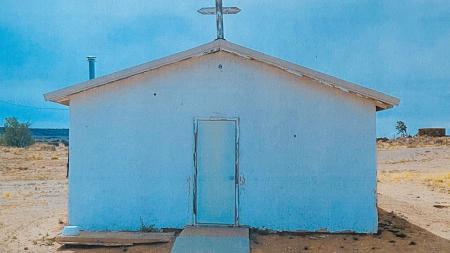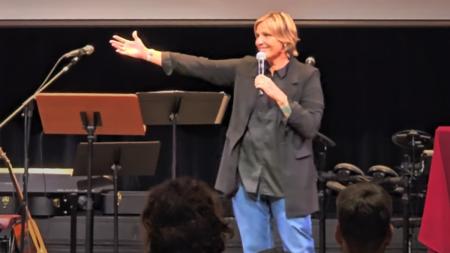Upcoming Tour of Civil Rights Sites

The Evangelical Covenant Church
Standing in the pulpit of Dexter Avenue Baptist Church during a Sankofa tour in April 2009, Reggie Smith was flooded with emotion as he thought of Martin Luther King, Jr., preaching from that spot, his words advocating freedom and civil rights resounding through the sanctuary.
In early October, 10 years after he went on that tour with the Reformed Church in America, Smith will be leading Christian Reformed Church participants on another Sankofa journey. They will visit several spots, including King's church in Montgomery — and he hopes others also feel the weight of King’s presence in the place where the civil rights leaders launched a movement that would change history and eventually take his life.
“There is nothing like going on a Sankofa tour with others so you can understand together where important parts of our racial history took place,” said Smith, who is now director of the CRC’s Office of Race Relations and the Office of Social Justice.
Sankofa is a West African word meaning “looking backward to move forward.” The interactive Sankofa: A Journey Toward Racial Righteousness explores historic sites of importance in the “civil rights movement, places of oppression and inequality for people of color, while seeking to move participants toward healing the wounds and racial divide caused by hundreds of years of racial injustice in the United States,” according to a website describing the journey.
The stop at the Dexter Avenue church, where King helped to organize the Montgomery (Ala.) Bus Boycott in 1955, was just part of a journey to civil rights sites in the U. S. South sponsored by the RCA in 2009.
The Montgomery Bus Boycott was the first large-scale civil rights protest of African Americans in the United States. To draw attention to racial segregation, protesters refused to ride city buses in Montgomery for 13 months from Dec. 5, 1955, until Dec. 20, 1956. The boycott resulted in a U.S. Supreme Court ruling that segregation on public buses is unconstitutional.
When he visited Dexter Avenue Baptist Church, Smith was also struck by a powerful irony. Just down the street from that small, red-brick church where King had served was the state capitol building.
“That was where George Wallace was governor at the time. The two occupied nearly the same space. It was like Jesus and Herod being in the same space. Each knew who the other was,” said Smith, who will help in lead the Sankofa journey Oct. 4-7, mainly for members of the Christian Reformed Church. This is a first for the CRC and he hopes it can be an annual tour.
“You had the bitter rage of George Wallace and the nonviolent resistance of Martin Luther King. It was like the church and state could look right down the street at each other.”
Sponsored by Calvin Theological Seminary, the Office of Race Relations, and Congregations Organizing for Racial Reconciliation (CORR), the Sankofa bus trip will pair African Americans with non-African Americans so that they can share and discuss the experience of making stops in Ferguson, Mo., Memphis, Tenn., and Birmingham, Selma, and Montgomery, Ala.
“Today, race can still be a delicate topic to discuss, but going on a tour such as this can build some of the space where deeper conversations can happen,” said Smith, who was pastor of Roosevelt Park CRC in Grand Rapids, Mich., a decade ago when he participated in the 2009 Sankofa journey.
“You can hear the same language, see the same places. . . . Doing this can break down resistance and barriers of racial understanding. . . . It can give people a different angle on building a new conversation about race.”
Looking back on his trip 10 years ago, Smith recalls walking in Selma, Ala., across the Edmund Pettus Bridge, where on March 7, 1965, armed police riding horses attacked and beat civil rights demonstrators with billy clubs and sprayed tear gas as people attempted to march to the state capital, Montgomery.
A student of history, Smith imagines what that day, often called Bloody Sunday, was like — the acrid gas, the screams, the violence on the faces of the police, the determination in the eyes of protesters.
Walking with others in April 2009, he said, he sensed the pull of the past, the power of a seminal event that helped to lead and played an instrumental role in passing national civil rights legislation. “A Sankofa journey lets you explore history together. It goes beyond books,” he said.
Smith also remembers visiting the 16th Street Baptist Church in Birmingham, Ala., where four girls died and other people were injured when 15 sticks of dynamite laid by members of the Ku Klux Klan exploded just before the start of a church service.
The church has long since been restored and remains a sacred place; the memory of those girls and of that day in September 1963 lingers.
“A profound sense of loss still hangs in that place,” said Smith. The stained-glass windows, blown out by the blasts, have been replaced with windows bearing images of the girls who were killed.
“When you are in a place that was once so shattered, you can think of what hate tried to do — but hate didn’t have the last word,” he said.
Throughout the 2009 trip, Smith had the chance to share his thoughts with others, including the white Reformed Church in America pastor who sat next to him on the bus.
In a video put out by the RCA at the time of the trip, Smith spoke about how these historic events touched his own life and ministry. He said he hoped the journey could help participants, himself included, “begin to dig into the deep roots of racism and begin to pull them out and begin to plant seeds of harmony, love, justice, mercy, and unity.”
Smith added that he hopes those who go on the trip in early October will be able to do this —- begin to pull out the weeds of racism and plant seeds of hope.
“Going to those places can create for us a sense of how we deal with terror and how we don’t need to allow terror to handicap us — and that by looking at these events we can be encouraged to speak light and hope into that darkness,” said Smith.
The October trip is nearly full. For more information, email Laura Pritchard: [email protected].


